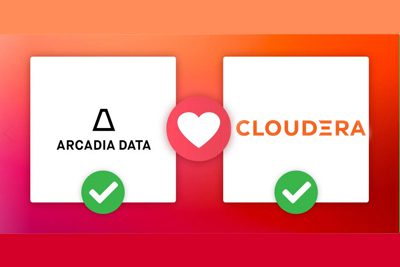Discussions of leading cloud computing often focus on the handful of U.S.-based companies—AWS, Microsoft Azure, IBM and Google—that lead the industry in terms of market share. That makes sense on one level but tends to obscure numerous other vendors, whose assistance is crucial to enterprises determined to capture the greatest value from their cloud computing and related investments.
One of the key players in this space is Cloudera. Founded in 2008, the company was an early mover in big data platforms and applications. However, Cloudera has also evolved steadily through organic development, acquisitions and strategic partnerships with key enterprise and cloud vendors to become a trusted partner for organizations of every kind.
Last week, the company announced new and upcoming data services based on the Cloudera Data Platform (CDP). Coming a year after the company purchased Arcadia Data, a provider of cloud-native, AI-driven business intelligence and analytics solutions, makes that acquisition seem particularly prescient. Let’s consider these new offerings and what they say about Cloudera’s position in the rapidly evolving and growing market for enterprise cloud.
Coping with radical change via data lifecycle integration
What is the inspiration or vision behind these new solutions? According to Cloudera, organizations are facing “a perfect storm of radical change, supercharged by the impact of a global pandemic.” Digital technologies are powering everything from buying groceries to face-to-face meetings, resulting in companies generating more data faster than ever before at virtually every point of business. That, in turn, is stressing traditional processes and practices.
But in what many consider an increasingly unbearable burden, Cloudera believes it is “an opportunity to make better business decisions, faster.” This is achieved via the CDP’s ability to leverage virtually unlimited quantities and varieties of data from any point in the data lifecycle. The result is what the company calls “data lifecycle integration.”
What exactly is this? Cloudera defines it as the ability to access and work on the same data securely and efficiently, no matter where that data may reside or where the analytics run. CDP is designed to effectively manage and secure data collection, enrichment, analysis, experimentation and analytics visualization. As a result, data-focused professionals can collaborate more effectively and support data-driven use cases that a business needs to better compete and serve its customers.
Cloudera’s new analytic experiences for CDP
The new CDP analytic experiences are enhancements to rather than replacements for Cloudera’s CDP Data Hub, a platform that enables data experts to integrate and manage data clusters for HBase, Hive, Impala, Kafka, NiFi, Spark and other big-data analytics technologies.
Instead, CDP analytic experiences enable data specialists, including analysts, engineers and scientists to access the precise information they need without the hassles of cluster management. The new CDP analytic experiences, include:
- CDP Data Engineering is an Apache Spark service on Kubernetes that is purpose-built for data engineers to address longstanding challenges of automating data pipelines. It achieves this through features, including GUI-based monitoring, troubleshooting and performance tuning, robust tools for orchestrating and automating job scheduling, resource isolation, GUI-based job management and CDP data lifecycle integration and SDX security and governance.
- CDP Operational Database is a high-performance, NoSQL database service that provides notably robust scale and performance for business-critical operational applications. It offers evolutionary schema that allow changes to be made to underlying data models without making changes to the application, auto-scaling based on cluster workload utilization, multi-modal client access that makes it accessible to developers who are used to building applications that use MySQL, Postgres, etc., and CDP data lifecycle integration and SDX security and governance.
- CDP Data Visualization simplifies the curation of rich, visual dashboards, reports and charts; provides analytical insights in the language of business; and, thus, democratizes access to data and analytics across the organization. Features include drag-and-drop custom interactive applications for sharing analysis and machine learning models and speedy data exploration via AI-powered natural language search and visual recommendations. As a result, business teams and leaders can more easily access and use data insights to inform business and strategic decision-making.
CDP Data Engineering is generally available on AWS. CDP Operational Database and CDP Data Visualization are in technical preview and are expected to be generally available later this year.
Final analysis
Rather than focusing simplistically on what customers need today, the best and most effective vendors are those who anticipate future changes and develop solutions and services to help their customers cope with those issues and thrive despite them. Cloudera assuredly belongs in this group, as the company’s steady evolution from its big data beginnings to being a key partner of leading enterprise IT and cloud vendors clearly demonstrates.
The company’s new CDP analytic experience solutions offer evidence for where Cloudera believes its customers and markets are going. Helping businesses cope with cloud-associated complexities and the growing volume, variety and velocity of data have long been common causes for many vendors. However, the continuing disruptions sparked by the COVID-19 pandemic and their likely continuation into 2021 mean that organizations also require help now.
In essence, the CDP Data Engineering, CDP Operational Database and CDP Data Visualization analytic experiences are designed to significantly enhance and simplify data analysis preparation, performance and democratization, capabilities that businesses need today and in the longer term. As a result, the new solutions should resonate with and be welcomed by both Cloudera customers and the company’s strategic partners.
Charles King is a principal analyst at PUND-IT and a regular contributor to eWEEK. © 2019 Pund-IT, Inc. All rights reserved.
